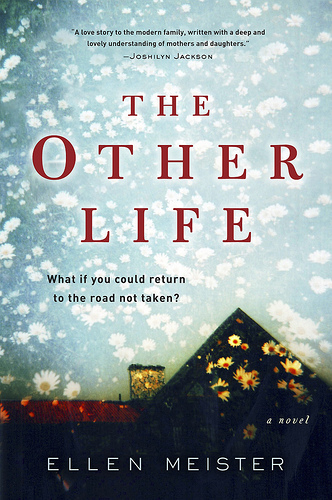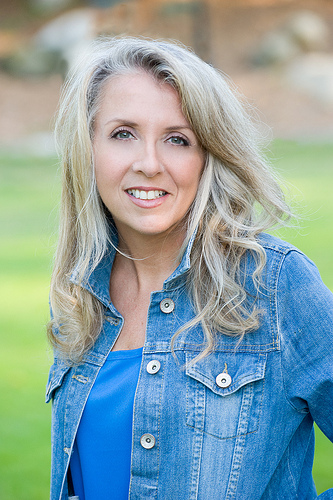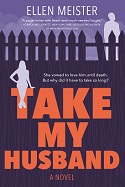 Synopsis:
Synopsis:
What if . . . ?
What if you had chosen differently? What if you had made different decisions? What would your life be like today? What kind of relationships would you have? Would the composition of your family be different?
Are you living an alternate life in a parallel universe? If so, can you find your way there and glimpse what your life there is like? Do you really want to know how differently things turned out for you? And if you manage to find your way there, what if you realize that you want to stay there, rather than return to your actual current life? What — or who — would you be willing to give up in order to remain there?
Quinn Braverman has always had the sense that she is one of two Quinns and, as a child, she even questioned her mother, Nan Mazursky, about “the other Quinn.” Now thirty-six years old, married to Lewis, and the mother of six-year-old Isaac, Quinn is pregnant with her second child. And she is frightened. Her unborn girl, Naomi, has been diagnosed in utero with a potentially life-threatening condition. Even if the baby survives to term, she could be born with severe disabilities. Quinn cannot stand the thought of aborting her child, but does not believe that she has the strength to endure losing the baby at birth or shortly thereafter, either. She is lost, and desperately wishes that her mother were alive to support and counsel her.
But Nan took her own life seven years ago. Quinn goes to her parents’ home and spends time in her mother’s art studio, often talking to her mother as though she were there with her, surrounded by Nan’s paintings, including a series of portraits of Quinn at various ages and one unfinished portrait of Quinn and Nan. Quinn has always felt that Nan became extremely depressed and angry because Quinn left her long-time boyfriend, Eugene. Although Eugen was a codependent and needy radio shock jock, he had a wonderful relationship with Nan. When Quinn met and fell in love with Lewis, Quinn sensed Nan’s displeasure.
Ever since Lewis and Quinn purchased their home in the suburbs, Quinn has been convinced that there is a portal in the basement through which she can travel to her alternate life. Thus far, she has resisted crawling into the portal and letting it pull her to the life that she is living simultaneously with her current one. But the news about the baby has weakened Quinn’s resolve. Once she enters the portal and is transported to her other life, she realizes that the other Quinn remained with Eugene, continues residing in Manhattan, and is childless. Most importantly, in her other life, her mother is still alive! But each time Quinn allows herself to glimpse what is happening in her other life, it becomes more difficult to return. Does she want to continue her life with Lewis, Isaac, and her as-yet-unborn daughter? Or should she remain permanently in her other life where her mother is alive, healthy, and able to provide her the love and support she has so desperately needed and missed for the past seven years?
Review:

Author Ellen Meister says she got the idea for The Other Life one morning when she was at home alone, escaping into her writing. She wondered to herself what would happen if a woman like her — a wife and mother — could literally escape by slipping through a portal to the life she would have had if she had made different choices. She realized that she might have stumbled onto the idea for a novel. From there, she had to conceptualize just what such a woman would want to escape from. Once Meister decided that her main character would be dealing with the aftermath of her mother’s suicide, the story really began taking shape. “It took a long time, but when I finally realized that my character’s mother was alive in one life and not in the other, I knew I had a book,” she says.
“The Road Less Traveled” by Robert Frost has always been one of my favorite poems, so Meister’s central theme resonated with me. Who hasn’t wondered how their life might have turned out? No one. Thus, every reader can relate because everyone has paused — even just momentarily — to wonder how things might have turned out if just one small aspect of his/her life had unfolded in a different fashion. If a relationship had ended or not ended, if a job offer had been accepted or declined, if a different college had been selected, if a different route had been taken to work on a particular morning . . . if, if, if . . . So many parts of our lives, altered in the slightest way, could greatly impact our future.
Quinn Braverman is a woman who has always known that she was not like other people, but has never understood why. Her mother did not answer the questions she posed as a young child. She has never been able to shake the overwhelming sense that she is one of two identical people and her counterpart is living somewhere else. But where? She has believes it would be possible to glimpse how the other Quinn is living, what she is doing. But until confronted with the devastating news about the baby she is carrying, she has never been tempted to escape into the parallel reality that she has always known has been playing out at the same time as her actual life. It is the notion of escaping her overwhelming emotional burdens finally draws her to the portal that she has always known to exist in the basement of her home. And miraculously, she finds herself in Manhattan in the bathtub of the apartment she shares with Eugene. She is not pregnant and she is not the mother of little Isaac. Interestingly, she also has complete memories of everything that has happened to her in her alternate life, as well as her memories from her real life. So she has the perfect vantage point from which to examine the quality of her choices and whether or not she has been happy on the road she did not take.
The second universal theme explored by Meister has to do with mourning a loved one, particularly one’s mother. Again, Meister taps into emotions with which every reader who has ever lost someone can identify: If only we could have one more conversation with that person, get one more hug from him/her, have one more moment in which to say the things we did not say before they died, especially those all-important words, “I love you.” And in the case of a mother gone too soon — a mother who chose to leave her two adult children by taking her own life — the desire to see and speak to that parent one last time in order to get answers to all the lingering questions can be paralyzing.
What would be traumatic enough to make the woman want to cross from her happy life to her alternate reality? And what could she find on the other side that would create enough of an emotional pull to threaten her family?
~~ Author Ellen Meister
The result is a mesmerizing and satisfying tale of a woman dealing with two unbelievably tragic events who must come to grips with her past in order to face her future. Quinn is remarkably average and, accordingly, empathetic. Like so many women, she is primarily a caretaker; she needs to be needed, which is why she was drawn to and stayed with Eugene for so long. And those traits also drew her to the generous, kind-hearted Lewis who surprised her with his magnanimity and desire to protect her. Both Eugene and Lewis are good men and Meister wisely makes both of them acceptable life partners for Quinn, depending upon whether she wants to marry and have children, rather than support and steer Eugene to greater media success. At one point, he is distraught because there is the possibility that he will land a late-night talk show. Quinn tells him he should be flattered and excited that he is being considered for the job, but he can only see the glass half-full: If he doesn’t get the job, everyone will know that he was passed over and even if he does get the job, there is the possibility that he will fail. For Quinn, staying with Eugene means a lifetime of seeing him through such neurotic episodes. And she has felt guilty in the ten years since she left him for Lewis, because he swore he could not live without her and his career did, in fact, sputter after her departure.
Quinn has also felt guilty about Nan’s death, convinced that her decision to marry Lewis was so devastating for Nan that it contributed to Nan’s decision to take her own life. The last conversation Quinn had with Nan was about the portrait Nan was working on. Was Nan sending her a message through the painting? Quinn is so disturbed by the unanswered questions that she cannot even bear to look at the painting, so she keeps it covered in Nan’s studio. When Quinn realizes that in her other life, her mother is still alive and has never painted that particular portrait. Quinn longs to spend time with her and keep her alive.
For Nan’s part, she is wracked with maternal feelings of guilty and inadequacy. She struggled with bipolar disorder, depressed for long periods of time, during Quinn’s childhood. And it was a traumatic event in Quinn’s early life, caused by Nan, that led to Quinn’s duplicate existence and deep sense of being unsettled. Nan would love to make things right for Quinn and guide her to make choices that will lead her to enduring happiness. But can she? What is she willing to give up in order to see her daughter happy?
In considering her relationship with her mother, Quinn examines how important her own children are to her. She contemplates remaining in her other life, but the choice becomes more difficult when she realizes that when she enters the portal and crosses over, she actually disappears from her real life. So she knows that if she decides to remain on the other side with Eugene, leaving behind Lewis, Isaac and little Naomi, who will never be born, she will be literally abandoning them. Quinn knows all-too-well what it feels like to be abandoned because of her mother’s suicide. Yet she grapples with whether or not Lewis or Isaac would be better off without her. Ironically, it is her own mother, speaking to her in her other life, who helps her understand how strong her love for her children is and what leaving them behind will actually mean for all concerned.
The Other Life pulls readers along just as strongly as the force that leads Quinn to climb into the portal and explore what lies on the other side. It is simply impossible to put the book down because the story is so unique and the issues Meister explores so multi-layered and fascinating that you are compelled to keep reading to see what Quinn will do next, what factors will be predominant in her decision-making, where she will remain.
There are many poignant moments, especially when Quinn first crosses to her other life and realizes that her mother is still alive. Anyone who, like me, has lost their mother will probably wipe away a few tears, wishing that, like Quinn, you could pick up the telephone just one more time to hear your mother’s voice and have just one more precious conversation with her. Any reader who is a parent will empathize with Quinn’s conflicted feelings about the child she is carrying, and agonize with her over the various options presented by her medical providers. Quinn faces choices that no parent should ever have to make . . . yet she must decide.
Ultimately, of course, Quinn is forced to face reality: She must pick one life or the other. Either choice comes at a significant cost. If she stays with Lewis, Isaac, and unborn Naomi, she will lose her mother forever. Alternatively, she could stay with Eugene and, perhaps, eventually marry him, giving her more time with her mother. One life is definitely easier than the other, yet what comes easily is rarely what gives us the most satisfaction. Time is running out . . . and the portal is literally closing. Each time she crosses back to her actual life, it is more difficult for her to return. Soon she will be trapped on one side or the other. But which will she pick?
Once Meister fine-tuned her theme, as a writer, she made several brilliant choices. First, she crafted Quinn as an “everywoman,” making her readily identifiable and empathetic with readers. Secondly, in The Other Life there are no villains. Both of the men Quinn has loved, Eugene and Lewis, are good men who love her. She was happy with Eugene until she met Lewis, and she has been happily married to Lewis for nearly a decade. While Eugene is neurotic and dependent, Lewis can be emotionally distant and unable to share his deepest feelings for Quinn because he strives valiantly to be her protector. So neither relationship is perfect, although both are fulfilling for Quinn. And Quinn’s family is dysfunctional and flawed, as all families are, but tight-knit and loving. Quinn is close to her brother, Hayden, who, like their mother, suffers from bipolar disorder.
Those two aspects of the characterizations ground the otherwise fanciful, magical story, and drive home the emotional depth of Quinn’s struggles. Quinn is not a whiner or malingerer. She is a woman coping with genuinely traumatic life events — the aftermath of a parent’s suicide, as well as the potential lost of or lifetime of caring for a severely disabled child. Thus, Quinn’s emotional conundrum and secret desire to escape from the pressures of facing her life circumstances are entirely believable, even if the manner in which she eludes reality is pure literary escapism.
The Other Life is an excellent selection for a book club because of the many topics Meister explores that lend themselves to vigorous discussion and debate. Meister says, “I think it’s human nature to wonder about what might have been. I believe it can be an effective coping strategy for when things get particularly stressful.” But there also comes a time when, in order to bravely face the future, one has to understand, accept, and be at peace with the past. The exploration of Quinn Braverman’s journey to that place of empowerment over her own life is an exhilarating and thoughtful one that lovers of women’s fiction should not miss.






5 Comments
Sounds like a very interesting read.
What a terrific review. This is one book that I wish I had a copy of. Need to see if our library has it.
We really have time to pause and reflect on ourselves. I guess I can relate to the book. I’m looking forward to having my own copy of this. Thanks for the share. =)
I read this book…it was good, but I call it “on the other side of different.”
..Stopping by from Cym Lowell’s Book Party.
Stop by my blog for a book giveaway:
LITTLE PRINCES BY CONOR GRENNAN
http://silversolara.blogspot.com/
Chelsey Emmelhainz of HARPER COLLINS is graciously providing FIVE copies for five lucky winners.
I’m so glad to know that Quinn isn’t just a whiner, that she really is a fully developed character – I can’t imagine being in her position!
Thanks for being on the tour. I’m glad to see this was a page turner for you.